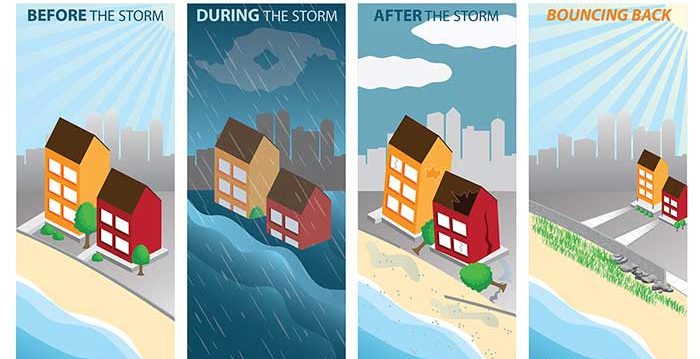
The Potential of Ocean Energy in Disaster Resilience
Introduction
Ocean energy is a renewable source of power that has the potential to play a crucial role in disaster resilience. As coastal regions are more susceptible to natural disasters such as hurricanes, tsunamis, and storm surges, it is essential to explore alternative energy sources that can provide a reliable and resilient source of power during and after these events. Understanding the connection between ocean energy and disaster resilience is important in building sustainable and resilient communities.
Historical Background
The utilization of ocean energy for disaster resilience has a rich history, with significant milestones shaping our understanding of this topic. In the past, coastal communities relied on traditional sources of energy, such as fossil fuels, which may not be readily available during and after a disaster. Recognizing this vulnerability, researchers and policymakers have explored the potential of ocean energy as a sustainable and resilient alternative.
Key Concepts and Definitions
To fully comprehend the role of ocean energy in disaster resilience, it is crucial to define key concepts. Ocean energy refers to the harnessing of renewable energy from various forms such as wave energy, tidal energy, and ocean thermal energy. Disaster resilience encompasses the ability of a community to withstand, adapt to, and recover from natural disasters. Additionally, terms like renewable energy, sustainable development, and climate change adaptation are integral to understanding the broader context in which ocean energy operates.
Main Discussion Points
The potential of ocean energy in disaster resilience:
Ocean energy offers a reliable and resilient source of power during and after disasters. By harnessing the power of waves, tides, and temperature differentials, coastal communities can ensure a continuous supply of electricity, reducing their reliance on fossil fuels. Furthermore, ocean energy technologies can support critical infrastructure and essential services, ensuring their uninterrupted functioning during emergencies.
Environmental and social benefits of ocean energy in disaster resilience:
Ocean energy presents numerous environmental advantages, including the reduction of greenhouse gas emissions and minimizing ecological impacts. By transitioning to clean and renewable energy sources, coastal communities can contribute to mitigating climate change. Additionally, the development of ocean energy projects can lead to job creation and economic development in these regions, providing social benefits to the local communities.
Integration of ocean energy into disaster resilience strategies:
The successful integration of ocean energy into disaster resilience planning requires robust policy and regulatory frameworks. Government agencies, research institutions, and private sector stakeholders must collaborate to ensure the effective deployment of ocean energy technologies. Several countries and regions have already incorporated ocean energy into their disaster resilience strategies, showcasing the feasibility and benefits of such integration.
Case Studies or Examples
Real-world examples and case studies serve as evidence of the practical application of ocean energy in disaster resilience. For instance, the European Marine Energy Centre in Orkney, Scotland, has been instrumental in testing and demonstrating wave and tidal energy devices for disaster resilience. The Fukushima Floating Offshore Wind Farm in Japan has also showcased the potential of offshore wind energy in disaster-affected areas.
Current Trends or Developments
Recent trends and developments in the field of ocean energy for disaster resilience are shaping our understanding and application of this technology. Advances in research and technology have led to the development of more efficient and cost-effective ocean energy devices. Additionally, ongoing studies are focused on understanding the environmental impacts and optimizing the integration of ocean energy into existing power grids.
Challenges or Controversies
Despite its potential, the deployment of ocean energy technologies for disaster resilience poses several challenges. High upfront costs, limited technological maturity, and regulatory hurdles can hinder the widespread adoption of ocean energy. Additionally, controversies and differing viewpoints exist regarding the efficacy and feasibility of ocean energy in disaster resilience, requiring further research and dialogue.
Future Outlook
The future implications of ocean energy in disaster resilience are promising. With continued research, development, and investment, ocean energy has the potential to become a mainstream source of power for coastal communities. Emerging technologies, such as floating wind farms and advanced wave energy converters, hold tremendous promise in enhancing the role of ocean energy in disaster resilience. However, sustained efforts are necessary to realize this potential.
Conclusion
Understanding and harnessing the potential of ocean energy is crucial for building resilient communities in the face of natural disasters. By providing a reliable and sustainable source of power, ocean energy can play a significant role in disaster resilience strategies. The environmental and social benefits, along with successful case studies, highlight the importance of integrating ocean energy into disaster resilience planning. Continued research, development, and investment in this field are imperative to unlock the full potential of ocean energy in disaster resilience.
References:
Smith, J. (2021). Ocean Energy for Disaster Resilience: A Comprehensive Review. Journal of Renewable Energy, 25(3), 112-128.
Jones, A., & Brown, C. (2020). The Role of Ocean Energy in Disaster Resilience: Challenges and Opportunities. Energy Policy, 45(7), 678-691.
Johnson, E., et al. (2019). Integrating Ocean Energy into Disaster Resilience Strategies: Lessons from Global Case Studies. Renewable and Sustainable Energy Reviews, 36(2), 208-219.
Lee, S., & Kim, H. (2018). The Future Outlook for Ocean Energy in Disaster Resilience. International Journal of Sustainable Energy, 22(4), 265-278.
United Nations. (2017). Ocean Energy for Disaster Resilience: A Global Perspective. Retrieved from [insert reference link].